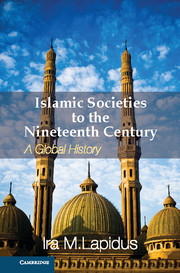Book contents
- Frontmatter
- Contents
- List of Illustrations
- List of Figures
- List of Maps
- List of Tables
- Preface
- Acknowledgments
- Acknowledgments to the first edition of A History of Islamic Societies
- Acknowledgments to the second edition of A History of Islamic Societies
- Publisher's Preface
- Introduction to Islamic Societies
- Part I The Beginnings of Islamic Civilizations
- Part II From Islamic Community to Islamic Society
- Egypt, Iraq, and Iran, 945–C. 1500
- Chapter 20 The Post-ʿAbbasid Middle Eastern State System
- Chapter 21 Muslim Communities and Middle Eastern Societies: 1000–1500 CE
- Chapter 22 The Collective Ideal
- Chapter 23 The Personal Ethic
- Chapter 24 Conclusion: Middle Eastern Islamic Patterns
- Part III The Global Expansion of Islam from the Seventh to the Nineteenth Centuries
- Glossary
- Bibliography
- Annotated Bibliography from A History of Islamic Societies, 2nd Edition
- Index
Chapter 22 - The Collective Ideal
Published online by Cambridge University Press: 05 February 2013
- Frontmatter
- Contents
- List of Illustrations
- List of Figures
- List of Maps
- List of Tables
- Preface
- Acknowledgments
- Acknowledgments to the first edition of A History of Islamic Societies
- Acknowledgments to the second edition of A History of Islamic Societies
- Publisher's Preface
- Introduction to Islamic Societies
- Part I The Beginnings of Islamic Civilizations
- Part II From Islamic Community to Islamic Society
- Egypt, Iraq, and Iran, 945–C. 1500
- Chapter 20 The Post-ʿAbbasid Middle Eastern State System
- Chapter 21 Muslim Communities and Middle Eastern Societies: 1000–1500 CE
- Chapter 22 The Collective Ideal
- Chapter 23 The Personal Ethic
- Chapter 24 Conclusion: Middle Eastern Islamic Patterns
- Part III The Global Expansion of Islam from the Seventh to the Nineteenth Centuries
- Glossary
- Bibliography
- Annotated Bibliography from A History of Islamic Societies, 2nd Edition
- Index
Summary
The new realities of state and religious institutions were reflected in an abundant literature of political theory. This theory had three principal branches: a Sunni theory of the caliphate that was the work of the scholars, a Persian-inspired genre of mirrors for princes, and a philosophical theory of the ideal state composed by commentators on Plato and Aristotle. Each of them responded in part to the changing social universe and in part to their own literary canons, but they also embodied a common perception of the ultimate significance of politics and community. The shared values and assumptions bring us to the core of the post-imperial conception of an Islamic society.
Sunni Theory
The Sunni theory of the caliphate was set forth in theological and juridical treatises. Sunni writers tried to explain why there should be a caliphate at all, what purposes the office served, what qualifications were required of its incumbents, how they were to be selected, and what were the obligations of subjects. The underlying assumption of the Sunni literature was that rulers held office to implement Islamic law and maintain the existence of the Muslim community. Before the middle of the tenth century, Muslim political debates turned on the question of who was qualified to hold this office. Sunnis proposed certain personal qualifications combined with an electoral process to guarantee the legitimacy of a ruler. Whereas Sunni authors discussed the formalities of assuming the office, including the formal act of designation, consultation with the religious scholars, the oath of investiture, and the contract with the community, legal thinking in effect justified the actual pattern of succession and especially the designation by the incumbent of his heir.
- Type
- Chapter
- Information
- Islamic Societies to the Nineteenth CenturyA Global History, pp. 293 - 301Publisher: Cambridge University PressPrint publication year: 2012



